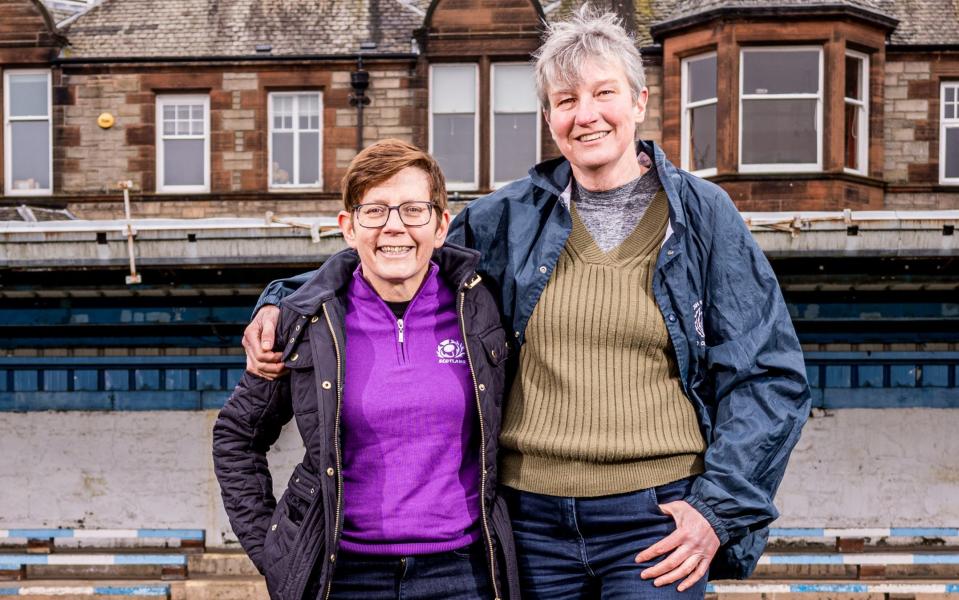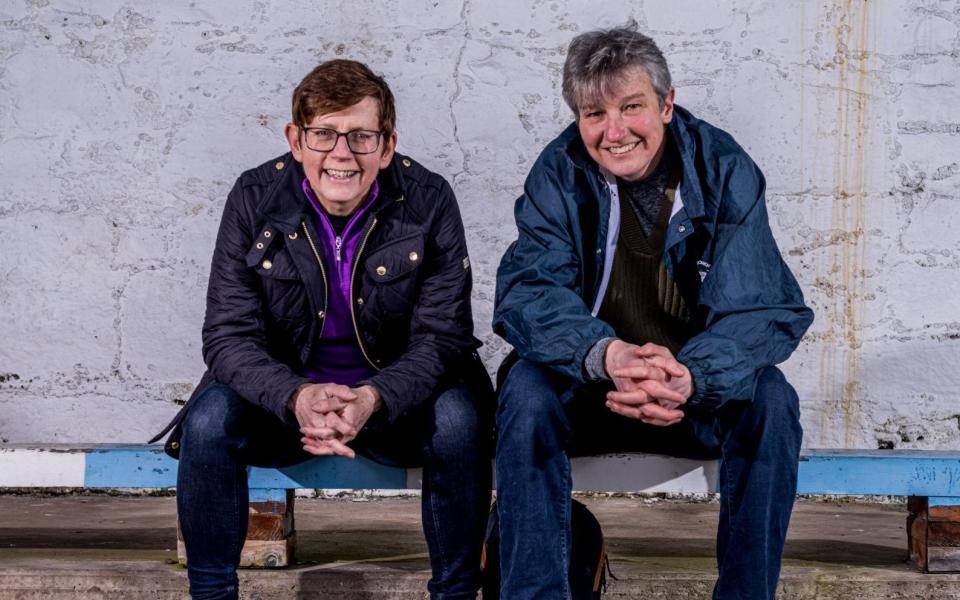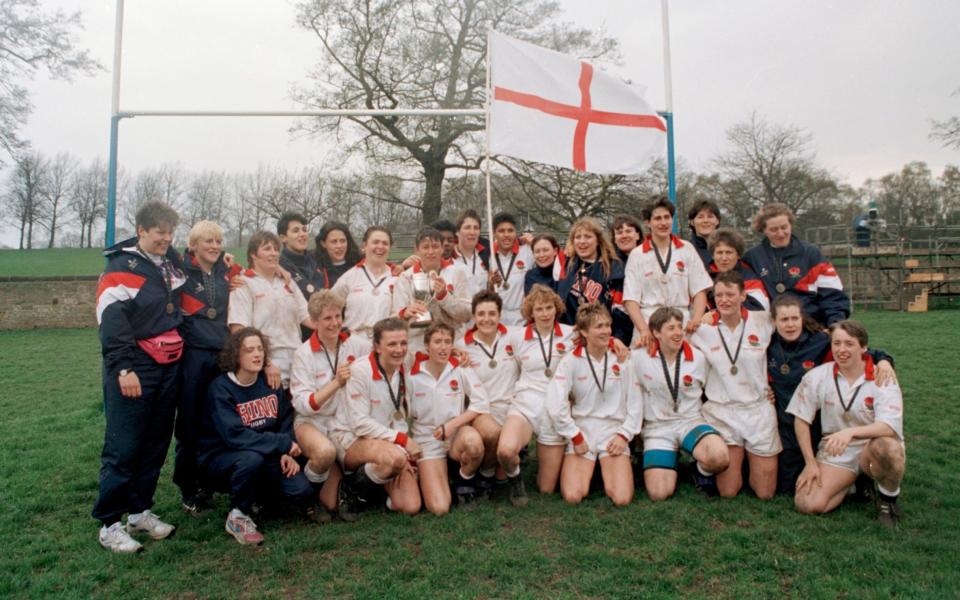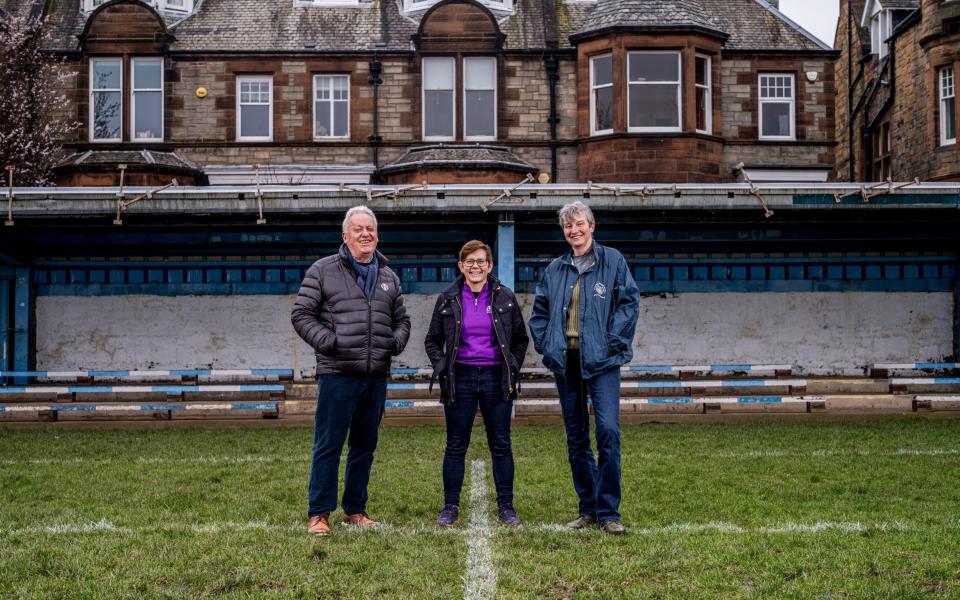‘More we drank, more we thought it was the best idea ever’: The World Cup organised in 90 days

It is 30 years since England won the Women’s Rugby World Cup in Scotland – a rebel event that may be the most unlikely tournament in sporting history.
In the face of powerful opposition from rugby union’s dinosaur overseers, it was cobbled together from a cupboard at Meadowbank Stadium, via fax machine, by a group of defiant Scotland players, outraged that their dream of playing in a World Cup was being taken away from them. They decided, in a Leith pub, that the 1994 tournament was going to happen despite a seemingly impossible deadline.
If this sounds like something from the pen of a scriptwriter, it is. The story is about to be told on stage in a musical, 90 Days, at Edinburgh’s Traverse Theatre, to commemorate the anniversary of a tournament that should never have been.
Sue Brodie sips her coffee in the Raeburn Hotel in Edinburgh. Out of the window, on a grey day in the Scottish capital, is the Edinburgh Academicals rugby ground where 6,000 people squeezed in to watch the 1994 final – the proud culmination of a game-changing fortnight.
Brodie was the driving force behind it all. She shakes her head, reminiscing.
“It was incredibly naive. There were 400 players coming from all over the world. There were a lot of things that could have gone wrong,” she says.
Beside her sits Sandra Colamartino, her Scotland team-mate, who explains why they pressed ahead anyway. “It was the only way of maintaining the progress of women’s rugby,” she says. “If we’d have lost the momentum then we could have been a decade behind where we are now.”

This weekend Scotland will play in front of a record crowd at Hive Stadium in Edinburgh in the Women’s Six Nations, but the sport was not so established 30 years ago.
In 1991 the first Women’s World Cup took place in Wales. On the back of this, the Netherlands had stepped forward to stage the 1994 event. The Scots, who had played their first international the previous year against Ireland at Raeburn Place, were one of 16 nations to sign up.
However, just three months before the event, the International Rugby Board told the Dutch that they did not have permission to stage any such tournament. So the World Cup was off, no matter that hundreds of dreams were being shattered in the process.
“It wasn’t the right time for the IRB,” says Colamartino. “They were being rushed into a conversation about women’s rugby that they didn’t want to be part of at the time. They actively sought to shut us down and put us in our place.”
Except that Brodie was not having it. She is quietly-spoken and calm, more of an organiser than a rabble-rouser, but still waters run deep.
“When the fax came through I was so disappointed,” says Brodie. “The combination of that emotion and the sense of ‘this just cannot happen’ spurred me on to do something.”
She called a team meeting in Todd’s Tap and outlined a plan so foolhardy it made perfect sense – after a few drinks anyway. Scotland’s women would host the tournament instead of the Netherlands. With no professional staff, no idea what they were doing and only 90 days to do it in.
“The more beer we drank the more convinced we were that it was the best idea we’d ever heard because it meant that our dream was alive again,” says Colamartino. “One of the players was a nurse so Sue said to her, ‘Well, you can organise all the ambulances’. I was a graphic designer at Heriot-Watt University so I was able to stay late and make the programme on the sly. My partner at the time worked in a bank. So he was the treasurer. It was all divvied up in that manner combining our skillsets and pooling our resources.”
Mission control – or broom cupboard central – for the “World Championship”, as they chose to call it to wrongfoot the IRB, was Meadowbank Sports Centre where Brodie was acting manager.
From a tiny room, grounds, referees, accommodation, accreditation, media access and everything else associated with a global tournament was pulled together in spare moments.
“Landlines, languages, time zones, fax machines… it was very stressful,” says Brodie. “But it was the only way of doing it. We just wanted to play.”

The IRB were threatening penalties for countries that competed. New Zealand and the Netherlands were among those who withdrew their teams. For it to be viable, 12 teams were needed and a fortnight before the tournament Spain dropped out, so Scottish Students were drafted in as emergency replacements.
Then came another bump in the road.
“Ten days before the start we were told the Russians didn’t actually have anywhere to stay. And they were arriving in Manchester with no money and no transport,” says Brodie. “I went on local radio and made an appeal – there was some momentum building around the tournament by then – and we got them two weeks’ accommodation at a nursing home in Livingston. It was right next to the rugby pitch so they got a training facility too.”
“It was seat-of-the-pants stuff,” adds Colamartino. “All they had with them when they arrived were lots of bottles of vodka and Russian dolls. Pizza Hut delivered them free pizzas every night and a minibus company gave them a bus for two weeks but the bus broke down on the way to the game against us. So they were late for that fixture.”
The Kazakhstan team, who brought a team hairdresser with them, had a bus and travelled all the way to Scotland in it to take part. It took them three days. The Japanese chose to fly in and wore identical bright red scrum caps in matches, which proved to be a commentator’s nightmare.
It was crazy stuff, the wild west World Cup, but there was something about the tournament which captured the imagination. The crowds turned out; the coverage ballooned. For the amateurs playing, it was glorious.
“Those were absolutely the best days of my life,” says Colamartino. “The excitement , the buzz, the thrill of the crowd, the experience we got to share. It was incredible.”
The Scots exited at the quarter-final stage, leaving England and defending champions United States to contest the final, which was shown on the BBC with the “Voice of Rugby” Bill McLaren in the commentary box. England prevailed 38-23 to become world champions for the first time.
The trophy and winners’ medals were theirs – except the medals did not have any reference to winners on them. “We didn’t have time to sort winners or runners-up medals so every player in the tournament got the same one,” says Colamartino.
That evening all the participants from the 12 nations met for a send-off dinner and ceilidh at Edinburgh’s Grosvenor House Hotel. Hair was spectacularly let down. Right at the end of the evening the fire alarm went off and everyone had to evacuate. It was a false alarm.
“The rumour was that the Americans had set the alarm off to get everyone out so they could steal the trophy,” says Colamartino. “One of the ceilidh band, who was sober, recalls seeing the Canadian team on the fire engine outside singing and dancing. The firemen enjoyed that.”
It was a suitable way to bring down the curtain on an unique world championship which, 15 years later, was finally granted World Cup status by the IRB.
It would have been the end of the story but for Colamartino. She thought it deserved a wider audience so, in a can-do style befitting of the 1994 World Cup itself, she enrolled in a screenwriting class. She wrote a script and showed it to Ed Crozier, a former SRU president who had been a touch judge at the tournament. He also happens to be a theatre producer.
That script, given a professional polish by award-winning TV screenwriter Kim Millar, has evolved into the musical Crozier will put on over the weekend of April 12-14. Tickets have already sold out and he hopes to take the show to London for next year’s Women’s World Cup and who knows where beyond.

“It has all the makings of another Calendar Girls,” he says. “To me this production is not totally about rugby the way that Chariots of Fire wasn’t totally about athletics. It’s about overcoming adversity and getting something done against the odds. The way Eric Liddell won the 400 metres in 1924 is like the way these girls brought this over the finishing line.
“When people see this I want them to think, ‘Anything is possible.’”
Even putting on a World Cup in 90 days.
Tickets (£20) are available to watch a live stream performance of 90 Days on Sat, April 13 at 8pm. See www.90daysplay.co.uk

